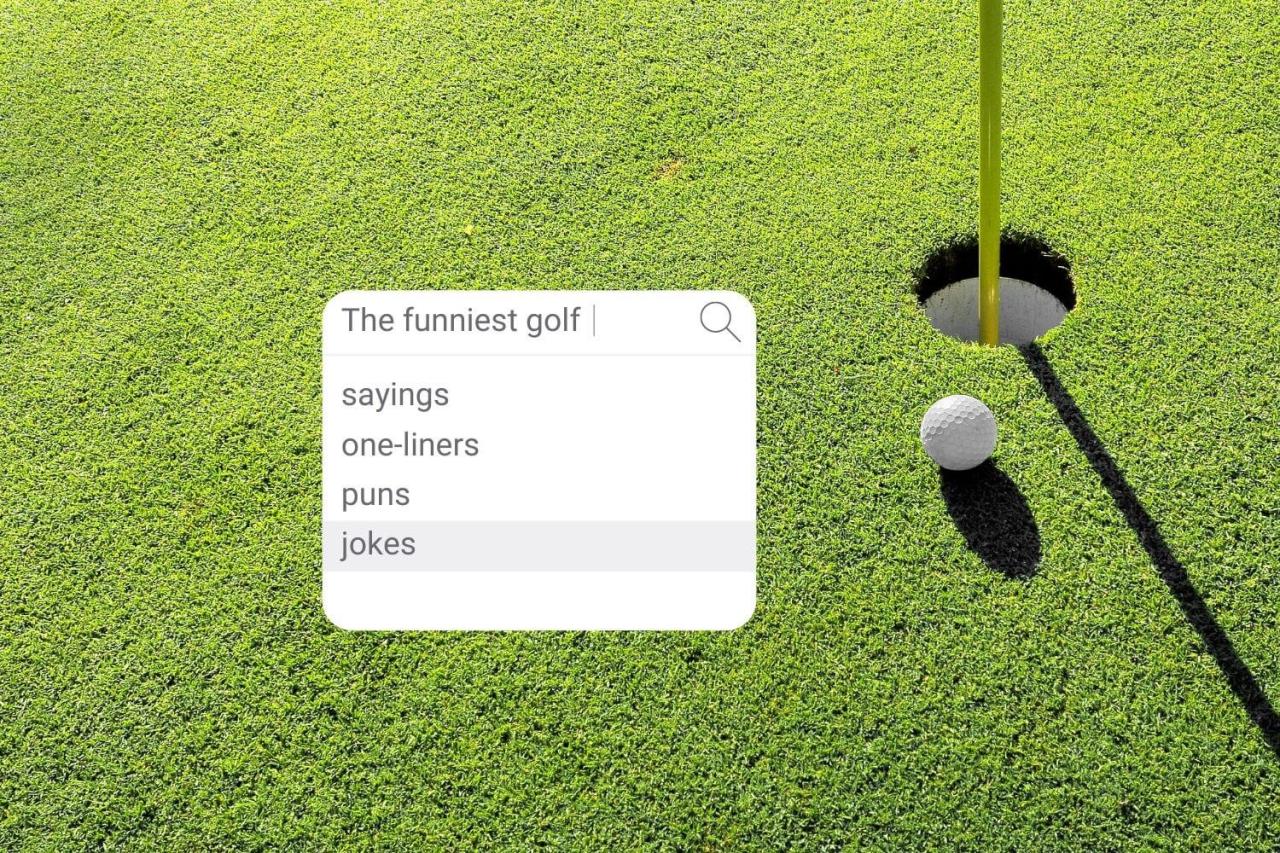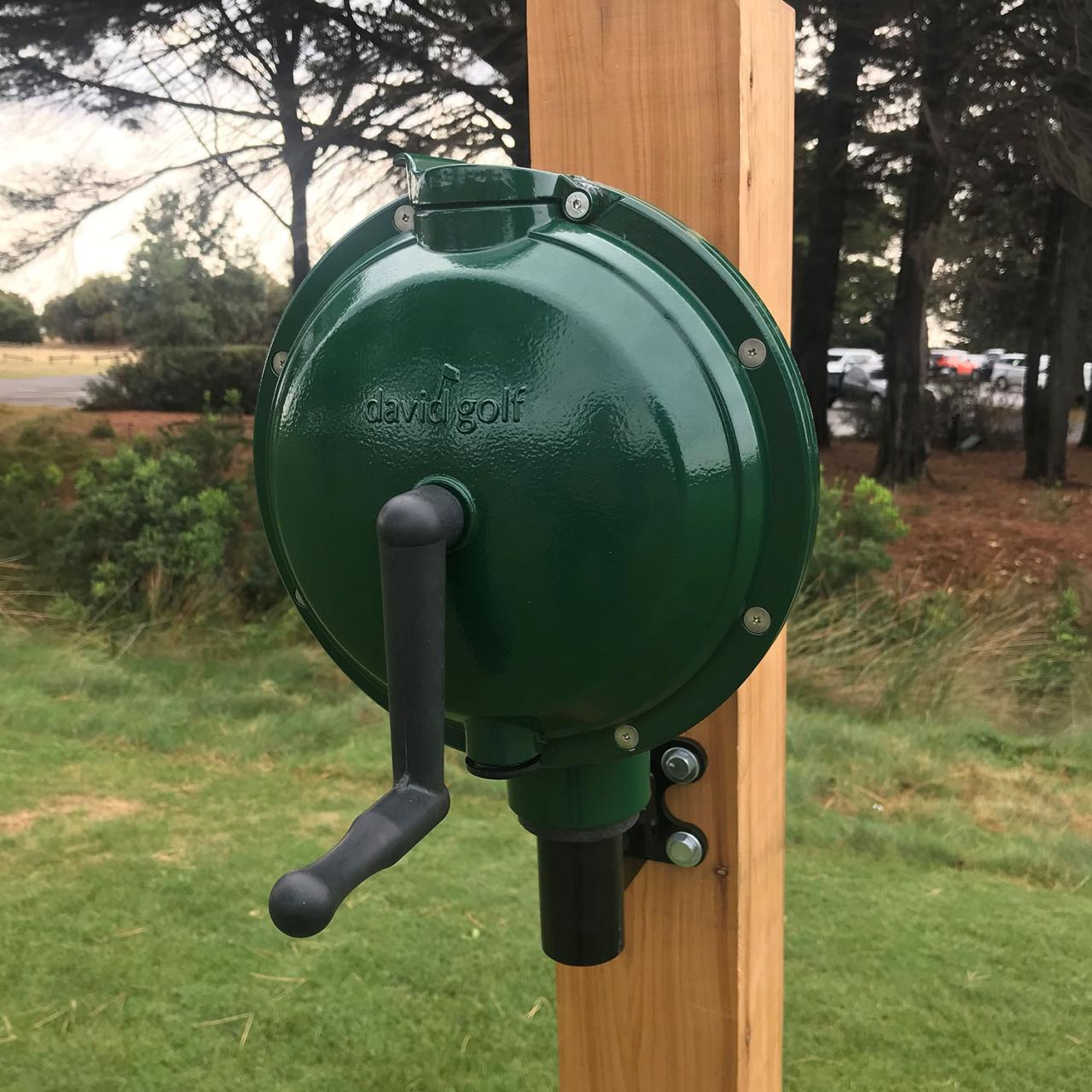Golf one liners – Golf one-liners set the stage for this enthralling narrative, offering readers a glimpse into a story that is rich in detail and brimming with originality from the outset.
From the earliest days of the game to modern-day social media, golf humor has evolved, reflecting the changing cultural landscape and the enduring appeal of the sport. This exploration delves into the history of golf one-liners, examining their various forms, the art of crafting them, and their impact on the game itself.
We’ll uncover how these witty quips have shaped the camaraderie on the course, contributing to a lighthearted atmosphere and fostering a sense of sportsmanship.
The History of Golf One-Liners: Golf One Liners

Golf humor has been a part of the game since its inception, evolving alongside the sport itself. From witty quips to satirical observations, golf one-liners have captured the essence of the game and its players, reflecting the changing cultural landscape and the enduring appeal of the sport.
The Early Days of Golf Humor
Early golf humor was often rooted in the game’s aristocratic origins. Jokes revolved around the social blunders of the wealthy, their attempts to master the game, and the inherent challenges of playing on challenging courses. The earliest known collection of golf jokes, “The Golfer’s Guide,” published in 1888, features quips like, “Why is golf like a marriage?
Because it’s a game you can’t win, but you can’t quit.” This early humor was often self-deprecating and lighthearted, reflecting the game’s evolving status as a pastime for the elite.
The Rise of Modern Golf Humor
As golf became more accessible in the 20th century, its humor broadened to encompass a wider range of themes. Jokes about the game’s frustrations, the personalities of famous players, and the inherent absurdity of the sport became more prevalent. This era saw the rise of iconic figures like Bob Hope, whose comedic routines often featured golf-themed jokes.
His famous line, “Golf is a good walk spoiled,” became a staple of golf humor, capturing the game’s paradoxical nature.
The Influence of Culture on Golf Humor
Golf humor has been influenced by the changing cultural landscape. As the game became more popular in the United States, American humor, with its emphasis on slapstick and observational comedy, found its way into golf one-liners. The rise of television and social media has further amplified the reach of golf humor, with viral videos and memes spreading jokes and catchphrases to a wider audience.
Examples of Classic Golf One-Liners
- “Golf is a game where you hit a little white ball with a stick and then curse a lot.” – Anonymous
- “Golf is a game that is played on a course of five and a half inches. It is the distance between your ears.” – Sam Snead
- “I’m not sure what’s harder, getting a hole-in-one or finding a decent golf joke.” – Anonymous
Types of Golf One-Liners

Golf one-liners are short, witty sayings that often use puns, wordplay, or observational humor to poke fun at the game of golf. They can be used to lighten the mood on the course, share a laugh with fellow golfers, or simply add a touch of humor to a day on the green.
They are a popular form of humor among golfers, and they can be found in a variety of formats, including jokes, quips, and even social media posts.
Puns
Puns are a common type of golf one-liner. They rely on the use of words that have multiple meanings or sound alike but have different meanings. This allows for a humorous play on words that can be both clever and amusing.
“I’m not sure what’s wrong with my golf game. I’ve been teeing off like a champ, but I can’t seem to get the ball in the hole.”
This pun plays on the word “teeing,” which can refer to the act of placing a ball on a tee or to the act of starting something. By using the word in both senses, the one-liner creates a humorous situation where the golfer is starting their game well but can’t seem to finish it.
Witticisms
Witticisms are short, clever sayings that often use sarcasm or irony to make a point. They are often used to poke fun at the absurdity of golf or to highlight the challenges of the game.
“I’m not sure why I play golf. I guess it’s because I enjoy walking five miles to hit a tiny ball into a small hole.”
This witticism uses sarcasm to highlight the absurdity of golf. The golfer is saying that they don’t really understand why they play golf, but they do it anyway because they enjoy the challenge of hitting a small ball into a small hole.
Observational Humor
Observational humor is a type of humor that relies on making funny observations about everyday life. In the context of golf, observational humor can be used to make light of the quirks and idiosyncrasies of the game.
“I love how golf is a game where you can spend hours trying to hit a ball into a hole, and then you have to spend another hour looking for it.”
This one-liner uses observational humor to point out the frustration of losing a golf ball. The golfer is making a humorous observation about the fact that golfers often spend more time searching for lost balls than they do actually playing the game.
The Art of Writing a Golf One-Liner

Crafting a successful golf one-liner is a delicate balancing act, requiring a keen understanding of brevity, wit, and relevance. It’s not just about making a joke; it’s about capturing the essence of the game and the personalities involved in a way that resonates with those who understand the unique language of golf.
Key Elements of a Good Golf One-Liner
The most effective golf one-liners are those that capture the attention of the listener or reader while simultaneously conveying a sense of humor and insight. They should be short, memorable, and relevant to the sport of golf.
- Brevity:A good golf one-liner should be concise and to the point. It should be short enough to be easily remembered and shared, but also contain enough information to be meaningful.
- Wit:The best one-liners are clever and witty, using wordplay, irony, or other literary devices to create humor. They should be able to make the listener or reader laugh, but also leave them thinking about the joke’s meaning.
- Relevance:A successful golf one-liner must be relevant to the game of golf. It should reference a specific aspect of the sport, such as a particular shot, a famous golfer, or a common golfing situation.
Techniques for Crafting Effective Golf One-Liners
Crafting effective golf one-liners requires a combination of creativity and technical skill. Here are some tips and techniques to consider:
- Use Wordplay:Wordplay is a powerful tool for creating memorable golf humor. This could involve using puns, double entendres, or other forms of wordplay to create a humorous effect. For example, “I’m not sure what’s wrong with my golf game.
I keep hitting the ball into the woods, but I can’t find any trees.”
- Embrace Irony:Irony can be a great way to create humor in golf one-liners. This could involve using sarcasm, understatement, or other forms of irony to highlight the absurdity of a situation. For instance, “I’m not sure what I’m doing wrong.
I keep hitting the ball into the water, but I’m pretty sure I’m supposed to be playing golf.”
- Draw on Common Golf Situations:One-liners are often most effective when they reference common golf situations that most golfers can relate to. This could involve a bad shot, a missed putt, or a frustrating round of golf. For example, “I’m so bad at golf, I could probably hit a ball into the water without even trying.”
- Reference Famous Golfers:Many golf one-liners are based on the exploits or personalities of famous golfers. This could involve referencing a famous shot, a memorable quote, or a golfer’s unique style of play. For instance, “I’m not sure if I’m playing golf or trying to emulate Tiger Woods.”
Using Literary Devices to Create Memorable Golf Humor
- Hyperbole:Exaggeration can be used to create humor in golf one-liners. For example, “I’m so bad at golf, I could probably hit a ball into the water without even trying.”
- Understatement:Understating a situation can also be humorous, especially when it’s a common golf occurrence. For example, “I’m not sure what I’m doing wrong. I keep hitting the ball into the water, but I’m pretty sure I’m supposed to be playing golf.”
- Personification:Giving human qualities to inanimate objects, such as a golf ball, can be a humorous way to create a one-liner. For example, “That golf ball must have a grudge against me. It keeps finding its way into the water.”
The Impact of Golf One-Liners on the Game
Golf one-liners, those witty and often self-deprecating quips exchanged on the course, are more than just amusing anecdotes. They play a crucial role in shaping the very essence of the game, contributing to its enjoyment, camaraderie, and even its competitive spirit.
Impact on Enjoyment and Camaraderie
Golf one-liners foster a sense of lightheartedness and camaraderie among players, transforming the potentially stressful experience of competition into a shared, enjoyable journey. They provide a common ground for players of all skill levels to connect and bond over their shared passion for the game.
The playful banter and shared laughter can help alleviate the pressure of performing well, allowing players to relax and simply enjoy the moment.
Impact on Pressure and Lightheartedness
The ability to laugh at oneself and the game’s inherent challenges is a valuable skill on the golf course. One-liners provide a healthy outlet for releasing tension and frustration, helping players maintain a positive attitude even when faced with setbacks.
This lighthearted approach can lead to improved focus and performance, as players are less likely to be bogged down by negative thoughts.
Role of Humor in Sportsmanship
Humor can be a powerful tool for promoting good sportsmanship. By using one-liners to acknowledge mistakes and celebrate successes, players can create a more positive and encouraging atmosphere on the course. This can help to foster a sense of respect and camaraderie, even among competitors.
“A good golf shot is like a good joke: if you have to explain it, it wasn’t very good.”
Unknown
Famous Golf One-Liners
Golf, a sport steeped in tradition and filled with colorful characters, has produced a wealth of memorable one-liners. These pithy pronouncements capture the essence of the game, its challenges, and its unique blend of skill, luck, and frustration. They offer a glimpse into the minds of some of the game’s greatest players, commentators, and personalities, providing enduring insights and moments of humor.
Notable Golf One-Liners
The following table showcases some of the most famous golf one-liners, highlighting the speaker and the context behind their memorable words:
| One-Liner | Speaker | Context |
|---|---|---|
| “I’m not sure what’s wrong with my game, but I’m not sure I want to find out.” | Arnold Palmer | Often quoted when Palmer was struggling on the course. |
| “The only reason I play golf is so I can drink beer and eat sandwiches in the afternoon.” | Gary Player | Player, known for his athleticism and competitive spirit, playfully acknowledges the social aspects of the game. |
| “Golf is a game where you get penalized for being good.” | Jack Nicklaus | Nicklaus, considered one of the greatest golfers of all time, highlights the inherent irony of the game’s scoring system. |
| “The only thing worse than a bad round of golf is a good round of golf that you don’t remember.” | Lee Trevino | Trevino, known for his wit and colorful personality, captures the fleeting nature of success in golf. |
| “I’ve never been a great putter, but I’ve been a great putter’s friend.” | Sam Snead | Snead, a legendary golfer with an exceptional swing, acknowledges his putting struggles with humor. |
Golf One-Liners in Popular Culture
Golf one-liners, those witty and often sarcastic quips about the game, have transcended the greens and fairways, finding a home in popular culture. They’ve become a staple in movies, TV shows, books, and even everyday conversations, contributing to the broader cultural understanding of golf and its humor.
These one-liners have not only entertained audiences but also influenced the way people perceive the sport, shaping its image in the public eye.
Golf One-Liners in Movies
Golf one-liners have become an integral part of the cinematic experience, adding humor and depth to films. These one-liners are often used to highlight the characters’ personalities, create comedic moments, or provide social commentary.
- In the 1996 film “Happy Gilmore,” the titular character, a hockey player turned golfer, delivers a memorable line: “You know what they say, ‘If you can’t be good, be outrageous.'”. This one-liner encapsulates the film’s irreverent humor and the unconventional nature of Happy Gilmore’s golfing style.
- The 2000 film “Caddyshack” is known for its abundance of quotable golf one-liners, including the iconic line: “It’s in the hole!” uttered by the character Carl Spackler, while battling a gopher on the green.
Golf One-Liners in TV Shows
Golf one-liners have also found a place on television, appearing in sitcoms, dramas, and even reality shows. These one-liners often serve as a way to lighten the mood, create comedic tension, or provide a commentary on the characters’ lives.
- In the popular sitcom “Seinfeld,” the character George Costanza famously declares, “I’m not a golfer, I’m a golfer-in-training.” This one-liner reflects George’s self-deprecating humor and his tendency to overthink and exaggerate.
- In the long-running drama “The Sopranos,” Tony Soprano, the head of a New Jersey mob family, uses golf as a metaphor for life, often quoting the line: “Life is like a golf game, you gotta play it one shot at a time.” This one-liner highlights the show’s exploration of the complexities of human nature and the challenges of life.
Golf One-Liners in Books
Golf one-liners have also found their way into literature, appearing in novels, short stories, and even poetry. These one-liners often serve as a way to add humor, provide social commentary, or offer a glimpse into the characters’ thoughts and motivations.
- In the novel “The Great Gatsby” by F. Scott Fitzgerald, the character Tom Buchanan, a wealthy and arrogant man, makes a condescending remark about golf: “I’m glad they’ve got a golf course here. I’m not much of a golfer myself, but I enjoy watching the boys play.” This one-liner highlights Tom’s disdain for the working class and his superficiality.
- In the short story “The Open Boat” by Stephen Crane, the narrator, a journalist stranded at sea with three other men, compares their situation to a golf game: “We were all in the same boat, but we were all playing different games.” This one-liner highlights the story’s theme of human resilience and the challenges of survival.
The Impact of Golf One-Liners on Popular Culture, Golf one liners
Golf one-liners have had a significant impact on popular culture, shaping the way people perceive the sport. These one-liners have often been used to make golf more accessible and relatable to a wider audience, breaking down stereotypes and highlighting the humor and camaraderie that are often associated with the game.
- Golf one-liners have contributed to the popular image of golf as a leisurely and enjoyable activity, often associated with wealthy and sophisticated individuals.
- These one-liners have also helped to create a sense of community among golfers, fostering a shared understanding of the game’s unique challenges and joys.
Questions Often Asked
What is the difference between a golf joke and a golf one-liner?
A golf joke is typically a longer story with a punchline, while a golf one-liner is a short, witty statement that often relies on wordplay or observation.
Who are some famous golfers known for their one-liners?
Some notable golfers known for their humor include Arnold Palmer, Gary Player, and Lee Trevino.
Are golf one-liners only for golfers?
No, golf one-liners can be enjoyed by anyone who appreciates humor, even if they don’t play golf.

